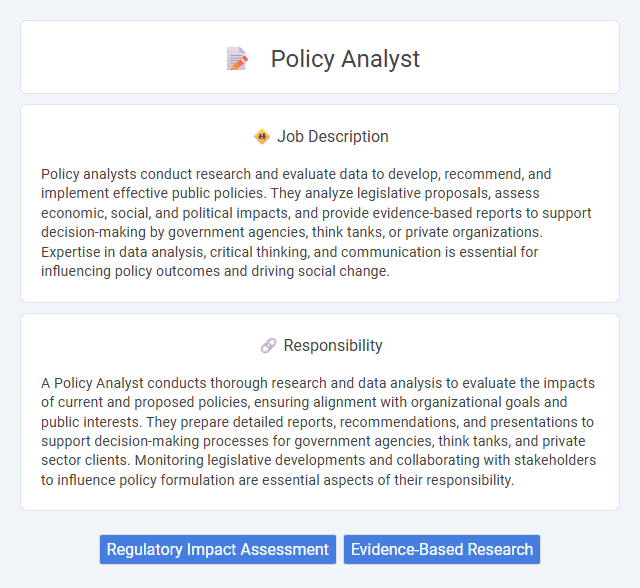
Policy analysts conduct research and evaluate data to develop, recommend, and implement effective public policies. They analyze legislative proposals, assess economic, social, and political impacts, and provide evidence-based reports to support decision-making by government agencies, think tanks, or private organizations. Expertise in data analysis, critical thinking, and communication is essential for influencing policy outcomes and driving social change.
Individuals with strong analytical skills and a passion for understanding social issues are likely suitable for a policy analyst role. Those who thrive in environments that require critical thinking, research, and data interpretation may find this job aligns well with their strengths. People who prefer collaborative problem-solving and possess effective communication skills probably fit the demands of this position.
Qualification
A Policy Analyst typically holds a bachelor's or master's degree in public policy, political science, economics, or related fields, demonstrating strong research and analytical skills. Proficiency in data analysis, critical thinking, and effective communication is essential for evaluating policy impacts and crafting actionable recommendations. Experience with statistical software and knowledge of legislative processes enhance the ability to deliver evidence-based policy solutions.
Responsibility
A Policy Analyst conducts thorough research and data analysis to evaluate the impacts of current and proposed policies, ensuring alignment with organizational goals and public interests. They prepare detailed reports, recommendations, and presentations to support decision-making processes for government agencies, think tanks, and private sector clients. Monitoring legislative developments and collaborating with stakeholders to influence policy formulation are essential aspects of their responsibility.
Benefit
A Policy Analyst likely offers the benefit of providing data-driven insights that can improve decision-making processes within government or organizations. This role probably enhances strategic planning by identifying trends and evaluating the potential impact of proposed policies. Individuals in this position may experience opportunities for professional growth and influence in shaping public or corporate policies.
Challenge
Policy analyst roles likely involve navigating complex regulatory environments and interpreting multifaceted data sets, which often presents significant challenges. The probability exists that they must balance competing stakeholder interests while forecasting policy impacts under uncertain conditions. Adapting to rapidly changing political landscapes could frequently require innovative problem-solving and strategic thinking.
Career Advancement
Policy analysts play a crucial role in shaping public policies by conducting research, evaluating data, and providing strategic recommendations to government agencies or private organizations. Career advancement in this field often involves gaining specialized expertise in areas such as healthcare, environmental policy, or economic development, alongside developing strong analytical and communication skills. Progression typically leads to senior analyst positions, policy advisor roles, or leadership opportunities within policy departments, often requiring advanced education or professional certifications.
Key Terms
Regulatory Impact Assessment
Policy Analysts specialized in Regulatory Impact Assessment evaluate the potential economic, social, and environmental effects of proposed regulations to ensure informed decision-making. They utilize quantitative and qualitative data analysis to forecast regulatory outcomes, identify risks, and recommend improvements to optimize policy effectiveness. Their expertise supports government agencies and organizations in developing evidence-based regulations that balance stakeholder interests and promote sustainable growth.
Evidence-Based Research
Policy Analysts specializing in evidence-based research utilize data-driven methodologies to assess and develop effective policies that address societal issues. They collect, analyze, and interpret quantitative and qualitative data to inform decision-makers with accurate, reliable findings that support policy formulation and implementation. Expertise in statistical tools, program evaluation, and impact assessment is essential for producing actionable recommendations grounded in empirical evidence.
 kuljobs.com
kuljobs.com